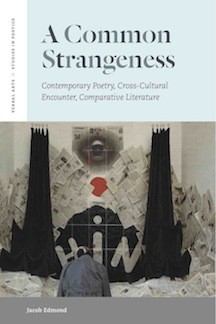
A Common Strangeness: Contemporary Poetry, Cross-Cultural Encounter, Contemporary Literature by Jacob Edmond
just out from Fordham University Press

Contents
Introduction I
I. Yang Lian and the FLlneur in Exile 15
2. Arkadii Dragomoshchenko and Poetic Correspondences 44
3. Lyn Hejinian and Russian Estrangement 72
4. Bei Dao and World Literature 95
5. Dmitri Prigov and Cross-Cultural Conceptualism 125
6. Charles Bernstein and Broken English 164
Conclusion 193
Google books allows a substanital preview of the book.
(An earlier and shorter version of chapter 2 is online here). Edmond explains that it focuses on Dragomoshchenko’s correspondences. These correspondences include both his 1,000 page correspondence with Lyn Hejinian and his development of the modernist complication—as exemplified by Baudelaire’s “Correspondances”—of romanticism’s stress on correspondence between language and the world. Interestingly, as I explore in the essay, this double meaning of “correspondence” does not work in Russian, which has two distinct terms: perepiska and sootvetstvie.
The blurbs:
"A Common Strangeness is unique among studies of contemporary poetics in being genuinely global in its perspective and its reach. At home in Russian and Chinese as well as American poetry and that of his native New Zealand, Jacob Edmond pinpoints the crucial relationships that exist between what are seemingly disparate poetic cultures. The Chinese poet Yang Lian, who lived in exile in Auckland, is read under the sign of Benjamin and Baudelaire. The American Language poet Lyn Hejinian's important dialogue with the Russian avant-gardist Arkadii Dragomoshchenko is studied carefully, and Bei Dao, Dmitri Prigov, and Charles Bernstein are treated as representative figures of cross-cultural thinking in the age of globalism. Edmond's is a provocative, exciting, and genuinely original study of the new poetics; we will all be learning from it!"-Marjorie Perloff, Professor Emerita, Stanford University
"This bold triangulation of six Chinese, Russian, and American poets advances lively current debates about global literature by exploring encounters that challenge the old binarisms and chart possibilities of literary singularities for a future poetics. Edmond's shrewd account of literary crossings in post-Cold War history helps us imagine how we can experience the challenge of new literary configurations."-Jonathan Culler, Cornell University
"Jacob Edmond addresses what he calls 'forms of textual strangeness' across contemporary poems of beautiful complexity and staying power. This theoretically astute book challenges us to read with a keener eye and to recognize how much poetry can tell us about political catastrophes, national dislocations, and promises of cultural renewal."-Stephanie Sandler, Harvard University
"Edmond differs from most scholars who make a point of crossing national and linguistic boundaries to speak of a new 'world literature' in that he deals with non-Anglophone as well as Anglophone writers and can give close readings of the former as well as the latter because he knows their languages and the histories of their literatures. The fact that he applies this knowledge to a number of representative poems makes his study unique. . . . He makes significant contributions in the areas of literary history, textual analysis, and a theory of comparative literature that 'negates commensurability in favor of superimposition, encounter, and touch."--Michael Heim, University of California, Los Angeles
"Ultimately the readings support an interpretation of Benjamin as authority for interpreting the experience of globalization, or 'common strangeness' as that experience appears in poetry. The close readings are . . . also very worthwhile in the context of critical discussion of World Literature." -Edward M. Gunn, Cornell University
"One of this book's secrets: it is, above all, a long essay on the relation between the general and the particular after deconstruction. What is it possible to say about poetry, or the global, in the face of the poem and the individual? As an antidote to these dichotomies, A Common Strangeness gives us triangles, operating in varied scales. Edmond's analysis of poets from the US, Russia, and China allows him to shed new light on the patterns of literary making and cosmopolitan thinking that drive the aesthetics of globalization today. Overlapping, Edmond's philosophical and linguistic triangles become hexagons, enneagons, dodecagons. These multiplying shapes provide fertile new ground for anyone interested in comparative poetics after 1989."-Eric Hayot, Penn State University